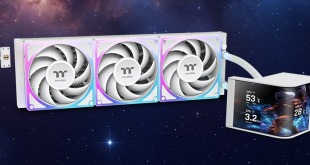While the challenges for AMD's ambitious 8 core Bulldozer product have been well documented, there is an improvement waiting in the wings. So what can we expect in 2012? KitGuru pulls an electron scanning microscope out of its pocket and heads for the local chip shop.
In a simple head-to-head, Intel Looks to have the advantage with its Sandybridge cores. They just seem to be able to process more data per cycle. So when Intel's old Senior VP, Pat Gelsinger, gave a TV interview and said “More cores are always better”, that might not be the case.
Another thing Pat was famous for saying was that software is always several years behind the hardware. That much is true.
Historically, AMD's rhetoric has focused a lot on performance per watt. Roll the clock back around 5 or 6 years and you'll find the market was getting a liberal peppering of statements about the importance of efficiency in design and the need to reduce power demand.
While AMD's Fusion team has managed to nail this and the Radeon team is a market leader – the CPU teams, working around projects like Bulldozer, seem to be struggling. For software with an intensive (and specific) level of parallelism, Bulldozer can shine, but the vast majority of apps do not fall into that category yet. We're left with the overclocking results that show Bulldozer's desktop performance figures coming in at the >400w watt mark.
It's not what AMD would have expected – and the Bulldozer team's game needs to be raised.
So what can we expect?
Well, the news from AMD in 2012 centres on an update to the present Bulldozer cores, called Piledriver.
The expected advantages comes from :-
- Increase in core capacity by up to 25%, making more cores available more of the time
- Reduced power requirement, making the chip more efficient
- Real world performance boost (clock led?) by something like 10%, making each core do more
But will it be enough?
The answer to that lies in 3 areas:-
- Can AMD bring this new technology to market in time to challenge Ivy Bridge?
- Can they do it in a cost effective way – allowing for competitive pricing ?
If Ivy Bridge is given 6 months of clear air, then it will be hard for the Piledriver cores to hit back, as Intel will have refined its process and be able to engage in (a) clock bumps and (b) price adjustments.
The cost efficiency of the AMD parts in 2012 will be crucial. Every chip can have a market, as long as the price is right. Charge more, and you risk being compared in the wrong market segment. For example, the 8150 Bulldozer + mainboard is around £300 and the 2600k + mainboard is around £30 more. That's probably a little close for comfort. The fact that the 2500k + mainboard is around £30 cheaper makes the world an even tougher place.
AMD is a ‘for profit' organisation, with shareholders to satisfy, so it's not possible to simply slash and burn pricing. Things need to be measured, considered and carefully executed to maintain gross profit margins.
Simply put, the pressure for a lot of AMD's success in the mainstream/enthusiast CPU sectors in 2012, will come from Global Foundries' ability to deliver.

KitGuru says: The market needs two CPU companies. It's vital for innovation and value. If AMD's production partner, Global Foundries, can kick its production programmes into gear, then the world looks good for the mass-market/value segments. But if the Piledriver products do not arrive until well after Ivy Bridge, then AMD won't be playing catch-up as much as being ketchup. Fingers crossed they can pull out a rabbit and keep Intel under pressure ahead of Haswell. Sources close to Intel have told KitGuru that the chip giant will be smiling, a lot, if all AMD can offer in the first half of 2012 is a 10% performance bump. The last big question remaining is, “Will AMD move some or all of its high-end CPU production to trusted partner TSMC?”.
Comments below or in the KitGuru forum.
 KitGuru KitGuru.net – Tech News | Hardware News | Hardware Reviews | IOS | Mobile | Gaming | Graphics Cards
KitGuru KitGuru.net – Tech News | Hardware News | Hardware Reviews | IOS | Mobile | Gaming | Graphics Cards


